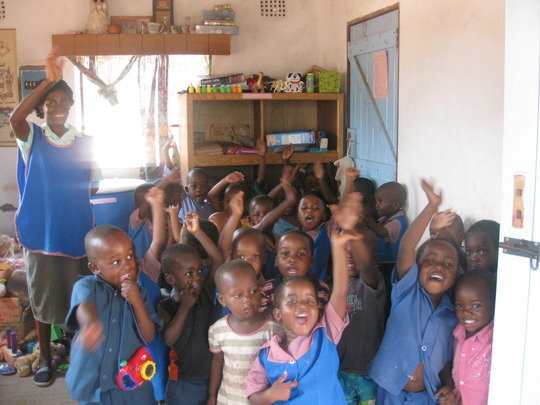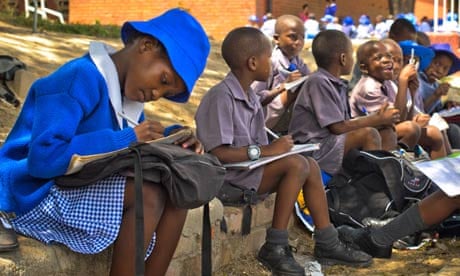The literacy rate in Zimbabwe is embarrassingly deteriorating
Zimbabwe's most touted
literacy rate of more than 90% has been disputed as having been outdated since the figures are based on the data collected by UNESCO and the government over a decade ago. The literacy rate of those over 15 years of age is dropping by half a percent every year and that is likely to escalate to 1% a year.
The Zimbabwean education situation is likely to worsen if the poor economic and political conditions in the country continue to prevail. The Zimbabwean literacy rate might even drop to 70% by 2020 if nothing is done with regards to solving political and economic problems which have proven to have a bearing on the education sector of the nation.
Zimbabwe's much touted literacy rate of more than 90% has been disputed
as having been outdated since the figures are based on data collected by
UNESCO and the government more than a decade ago. - See more at:
http://www.harare24.com/index-id-news-zk-13815.html#sthash.ooIk4w6k.dpuf
Zimbabwe's
much touted literacy rate of more than 90% has been disputed as having
been outdated since the figures are based on data collected by UNESCO
and the government more than a decade ago. - See more at:
http://www.harare24.com/index-id-news-zk-13815.html#sthash.ooIk4w6k.dpuf
Zimbabwe's
much touted literacy rate of more than 90% has been disputed as having
been outdated since the figures are based on data collected by UNESCO
and the government more than a decade ago. - See more at:
http://www.harare24.com/index-id-news-zk-13815.html#sthash.ooIk4w6k.dpuf
Zimbabwe's
much touted literacy rate of more than 90% has been disputed as having
been outdated since the figures are based on data collected by UNESCO
and the government more than a decade ago.
We roughly estimate
that the literacy rate for those over 15 is dropping a half percent each
year and that will accelerate to 1% each year as those who left school
after 2005 reach age 15," writes Zimbabwe Reads on its website.
The
same organization goes on to state that the Zimbabwean education
situation is likely to worsen if the current conditions continue to
prevail adding that Zimbabwe might not even be the continent's highest
literary country.
- See more at: http://www.harare24.com/index-id-news-zk-13815.html#sthash.KVskFvGl.dpuf
Zimbabwe's
much touted literacy rate of more than 90% has been disputed as having
been outdated since the figures are based on data collected by UNESCO
and the government more than a decade ago.
We roughly estimate
that the literacy rate for those over 15 is dropping a half percent each
year and that will accelerate to 1% each year as those who left school
after 2005 reach age 15," writes Zimbabwe Reads on its website.
The
same organization goes on to state that the Zimbabwean education
situation is likely to worsen if the current conditions continue to
prevail adding that Zimbabwe might not even be the continent's highest
literary country.
- See more at: http://www.harare24.com/index-id-news-zk-13815.html#sthash.KVskFvGl.dpuf
Low levels of literacy, and
education in general, can impede the economic development of a country in the current rapidly changing, technology-driven world and Zimbabwe is currently at a risk of becoming a completely economically crippled nation due to these poor education levels that are continuously decreasing.
The Zimbabwean government can only pay teachers' salaries since it is
collecting ever less tax in the shrinking economy as more and more
companies lose patience with the administration and pull out yet today, the government estimates that approximately a million children,
mostly from primary schools, will need help with school fees.
Classrooms used in Zimbabwe

Zimbabwe's
much touted literacy rate of more than 90% has been disputed as having
been outdated since the figures are based on data collected by UNESCO
and the government more than a decade ago.
- See more at: http://www.harare24.com/index-id-news-zk-13815.html#sthash.8tDsd2jD.dpuf
Zimbabwe's
much touted literacy rate of more than 90% has been disputed as having
been outdated since the figures are based on data collected by UNESCO
and the government more than a decade ago.
We roughly estimate
that the literacy rate for those over 15 is dropping a half percent each
year and that will accelerate to 1% each year as those who left school
after 2005 reach age 15," writes Zimbabwe Reads on its website.
The
same organization goes on to state that the Zimbabwean education
situation is likely to worsen if the current conditions continue to
prevail adding that Zimbabwe might not even be the continent's highest
literary country.
"If current conditions continue, Zimbabwe will
have a literacy rate of 70% in 2020. At this stage, it seems unlikely
that Zimbabwe still has the highest literacy rate in Africa, with the
more reliable estimates from Botswana (85%) and Tunisia (87%) probably
surpassing it," it states.
Zimbabwe Reads observes what it refers
to as "a very disturbing tendency" of high rate of children dropping
out of school since 2005 where it states that about 15% of the country's
children never enter the school system while a further 30% never make
it to secondary schools.
According to the organization, the
number of patrons in almost all the libraries in the country continue to
decrease since the late 80s with the current figures standing at as
less as half the 1989 figures.
"In 1989, there were more than
150,000 registered public library users using 76 public libraries. The
user numbers for 2011 are certainly less than half of that. The Bulawayo
Public Library reported 10,289 patrons for the year preceding July
2011; the National Free Library had 8016 patrons (but only 250 paid the
registration fee to borrow)."
The organization has also noted
that most libraries in the country carry materials that are published
only in English at the neglect of local languages estimating fewer than
50 titles in indigenous languages. Most books with titles in local
languages are reported to have been published long ago and have been
kept in stock by local bookshops like Mambo Press.
The Zimbabwean
government and UNESCO reports that the country has a literacy rate of
more than 90% with the current Minister of Education David Coltart
intensifying efforts to restore the education sector which had sharply
declined as a result of the economic meltdown which characterized the
country for a period spanning to more than a decade.
Meanwhile
the United Kingdom through its Department of International Development
(DFID), recently injected 24 million pounds (around 38 million USD) into
the United Nations Children's Fund (UNICEF) in Zimbabwe, to support the
country's second phase of the Education Transition Fund (ETF II) which
is a multi-donor pooled fund set up at the inception of the inclusive
government in 2009 by Education, Sports, Arts and Culture Minister David
Coltart in partnership with UNICEF in a bid to bridge the sector's
funding gap from emergence to recovery.
- See more at:
http://www.harare24.com/index-id-news-zk-13815.html#sthash.8tDsd2jD.dpuf
This is the current situation in Zimbabwe and it is likely to even get worse if our politicians continue to turn a deaf ear to these crucial problems that the nation is facing.
Zimbabwe's
much touted literacy rate of more than 90% has been disputed as having
been outdated since the figures are based on data collected by UNESCO
and the government more than a decade ago.
We roughly estimate
that the literacy rate for those over 15 is dropping a half percent each
year and that will accelerate to 1% each year as those who left school
after 2005 reach age 15," writes Zimbabwe Reads on its website.
The
same organization goes on to state that the Zimbabwean education
situation is likely to worsen if the current conditions continue to
prevail adding that Zimbabwe might not even be the continent's highest
literary country.
"If current conditions continue, Zimbabwe will
have a literacy rate of 70% in 2020. At this stage, it seems unlikely
that Zimbabwe still has the highest literacy rate in Africa, with the
more reliable estimates from Botswana (85%) and Tunisia (87%) probably
surpassing it," it states.
Zimbabwe Reads observes what it refers
to as "a very disturbing tendency" of high rate of children dropping
out of school since 2005 where it states that about 15% of the country's
children never enter the school system while a further 30% never make
it to secondary schools. - See more at:
http://www.harare24.com/index-id-news-zk-13815.html#sthash.8tDsd2jD.dpuf
Zimbabwe's
much touted literacy rate of more than 90% has been disputed as having
been outdated since the figures are based on data collected by UNESCO
and the government more than a decade ago.
We roughly estimate
that the literacy rate for those over 15 is dropping a half percent each
year and that will accelerate to 1% each year as those who left school
after 2005 reach age 15," writes Zimbabwe Reads on its website.
The
same organization goes on to state that the Zimbabwean education
situation is likely to worsen if the current conditions continue to
prevail adding that Zimbabwe might not even be the continent's highest
literary country.
"If current conditions continue, Zimbabwe will
have a literacy rate of 70% in 2020. At this stage, it seems unlikely
that Zimbabwe still has the highest literacy rate in Africa, with the
more reliable estimates from Botswana (85%) and Tunisia (87%) probably
surpassing it," it states.
Zimbabwe Reads observes what it refers
to as "a very disturbing tendency" of high rate of children dropping
out of school since 2005 where it states that about 15% of the country's
children never enter the school system while a further 30% never make
it to secondary schools. - See more at:
http://www.harare24.com/index-id-news-zk-13815.html#sthash.8tDsd2jD.dpuf
Zimbabwe's
much touted literacy rate of more than 90% has been disputed as having
been outdated since the figures are based on data collected by UNESCO
and the government more than a decade ago.
We roughly estimate
that the literacy rate for those over 15 is dropping a half percent each
year and that will accelerate to 1% each year as those who left school
after 2005 reach age 15," writes Zimbabwe Reads on its website.
The
same organization goes on to state that the Zimbabwean education
situation is likely to worsen if the current conditions continue to
prevail adding that Zimbabwe might not even be the continent's highest
literary country.
"If current conditions continue, Zimbabwe will
have a literacy rate of 70% in 2020. At this stage, it seems unlikely
that Zimbabwe still has the highest literacy rate in Africa, with the
more reliable estimates from Botswana (85%) and Tunisia (87%) probably
surpassing it," it states.
Zimbabwe Reads observes what it refers
to as "a very disturbing tendency" of high rate of children dropping
out of school since 2005 where it states that about 15% of the country's
children never enter the school system while a further 30% never make
it to secondary schools. - See more at:
http://www.harare24.com/index-id-news-zk-13815.html#sthash.8tDsd2jD.dpuf
Zimbabwe's
much touted literacy rate of more than 90% has been disputed as having
been outdated since the figures are based on data collected by UNESCO
and the government more than a decade ago.
We roughly estimate
that the literacy rate for those over 15 is dropping a half percent each
year and that will accelerate to 1% each year as those who left school
after 2005 reach age 15," writes Zimbabwe Reads on its website.
The
same organization goes on to state that the Zimbabwean education
situation is likely to worsen if the current conditions continue to
prevail adding that Zimbabwe might not even be the continent's highest
literary country.
"If current conditions continue, Zimbabwe will
have a literacy rate of 70% in 2020. At this stage, it seems unlikely
that Zimbabwe still has the highest literacy rate in Africa, with the
more reliable estimates from Botswana (85%) and Tunisia (87%) probably
surpassing it," it states.
Zimbabwe Reads observes what it refers
to as "a very disturbing tendency" of high rate of children dropping
out of school since 2005 where it states that about 15% of the country's
children never enter the school system while a further 30% never make
it to secondary schools. - See more at:
http://www.harare24.com/index-id-news-zk-13815.html#sthash.8tDsd2jD.dpuf













